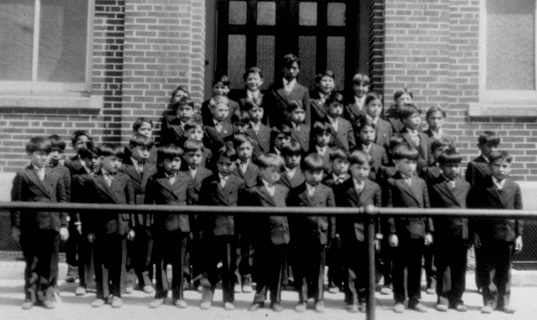Boarding Schools left a dark legacy over many tribes in North America. Indian children faced assimilation, abuse, discrimination and ethnocide on a scale never seen. Regardless of the efforts to “civilize” Indian children, the spirit of the tribes would not be broken.
"Kill the Indian in him and save the man." Richard Pratt, founder of the American boarding schools for Indian children

Little Traverse Bay Bands of Odawa Indians Repatriation, Archives and Records Department
Before the War of 1812, Odawa culture and customs went through changes that were, for the most part, voluntary by the tribe. Various Odawa families would adopt Christianity and western values; others would not.
Dress was chosen by function and preference, many times mixing traditional materials with European and American goods. Men still wore their hair in the fashion of warriors, along with piercings, tattoos and body paintings. Women and extended family were the primary care givers in the villages. Anishnaabamowin was spoken by the vast majority of Odawa at Little Traverse. All of these characteristics changed rapidly after the War of 1812. One mechanism that greatly accelerated these changes was boarding schools.
The first mission school at Little Traverse was built in 1829 and was a collaboration of the local Odawa and missionaries. During the next two decades, Catholic schools would be built at Cross Village, Middle Village and Burt Lake. In 1887 Indian education became dictated under federal standards which included the boarding school system. Odawa children, along with all Indian children across the United States, would be subject to some of the most intense assimilation in American history. Odawa children at the boarding schools would not be permitted to speak their native language or to participate in ceremonies or cultural activities. Severe punishment was administered when rules were broken. Prolonged stays at the school were common, sometimes years on end. The long absence from family and community, in conjunction with the strict rules of the school, resulted in a loss of language, culture and history for the tribe. The Holy Childhood boarding school in Harbor Springs opened in 1889 and ceased operation in 1983.
In the words of the founder of the American boarding schools Richard Pratt, “that all the Indian there is in the race should be dead. Kill the Indian in him and save the man.” What Pratt and others did not count on were the powerful bonds that would form at boarding schools and the fact that Indian culture would manage to survive.
Last updated: April 18, 2019
